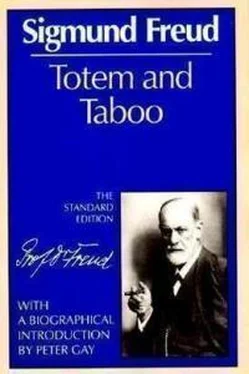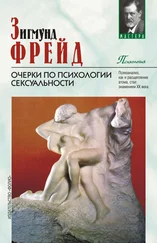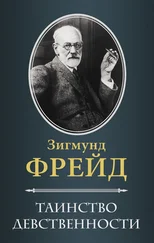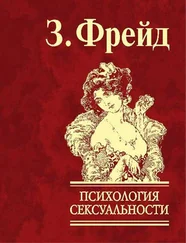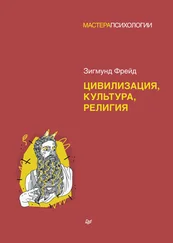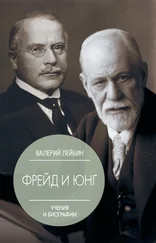Зигмунд Фрейд - Totem and Taboo
Здесь есть возможность читать онлайн «Зигмунд Фрейд - Totem and Taboo» весь текст электронной книги совершенно бесплатно (целиком полную версию без сокращений). В некоторых случаях можно слушать аудио, скачать через торрент в формате fb2 и присутствует краткое содержание. Год выпуска: 2014, Издательство: epubBooks Classics, Жанр: Психология, на английском языке. Описание произведения, (предисловие) а так же отзывы посетителей доступны на портале библиотеки ЛибКат.
- Название:Totem and Taboo
- Автор:
- Издательство:epubBooks Classics
- Жанр:
- Год:2014
- ISBN:нет данных
- Рейтинг книги:3 / 5. Голосов: 1
-
Избранное:Добавить в избранное
- Отзывы:
-
Ваша оценка:
- 60
- 1
- 2
- 3
- 4
- 5
Totem and Taboo: краткое содержание, описание и аннотация
Предлагаем к чтению аннотацию, описание, краткое содержание или предисловие (зависит от того, что написал сам автор книги «Totem and Taboo»). Если вы не нашли необходимую информацию о книге — напишите в комментариях, мы постараемся отыскать её.
Totem and Taboo — читать онлайн бесплатно полную книгу (весь текст) целиком
Ниже представлен текст книги, разбитый по страницам. Система сохранения места последней прочитанной страницы, позволяет с удобством читать онлайн бесплатно книгу «Totem and Taboo», без необходимости каждый раз заново искать на чём Вы остановились. Поставьте закладку, и сможете в любой момент перейти на страницу, на которой закончили чтение.
Интервал:
Закладка:
Before closing we must take into account that the remarkable convergence reached in these illustrations, pointing to a single inclusive relation, ought not to blind us to the uncertainties of our assumptions and to the difficulties of our conclusions. Of these difficulties I will point out only two which must have forced themselves upon many readers.
In the first place it can hardly have escaped any one that we base everything upon the assumption of a psyche of the mass in which psychic processes occur as in the psychic life of the individual. Moreover, we let the sense of guilt for a deed survive for thousands of years, remaining effective in generations which could not have known anything of this deed. We allow an emotional process such as might have arisen among generations of sons that had been ill–treated by their fathers, to continue to new generations which had escaped such treatment by the very removal of the father. These seem indeed to be weighty objections and any other explanation which can avoid such assumptions would seem to merit preference.
But further consideration shows that we ourselves do not have to carry the whole responsibility for such daring. Without the assumption of a mass psyche, or a continuity in the emotional life of mankind which permits us to disregard the interruptions of psychic acts through the transgression of individuals, social psychology could not exist at all. If psychic processes of one generation did not continue in the next, if each had to acquire its attitude towards life afresh, there would be no progress in this field and almost no development. We are now confronted by two new questions: how much can be attributed to this psychic continuity within the series of generations, and what ways and means does a generation use to transfer its psychic states to the next generation? I do not claim that these problems have been sufficiently explained or that direct communication and tradition, of which one immediately thinks, are adequate for the task. Social psychology is in general little concerned with the manner in which the required continuity in the psychic life of succeeding generations is established. A part of the task seems to be performed by the inheritance of psychic dispositions which, however, need certain incentives in the individual life in order to become effective. This may be the meaning of the poet’s words: “Strive to possess yourself of what you have inherited from your ancestors.” The problem would appear more difficult if we could admit that there are psychic impulses which can be so completely suppressed that they leave no traces whatsoever behind them. But that does not exist. The greatest suppression must leave room for distorted substitutions and their resulting reactions. But in that case we may assume that no generation is capable of concealing its more important psychic processes from the next. For psychoanalysis has taught us that in his unconscious psychic activity every person possesses an apparatus which enables him to interpret the reactions of others, that is to say, to straighten out the distortions which the other person has affected in the expression of his feelings. By this method of unconscious understanding of all customs, ceremonies, and laws which the original relation to the primal father had left behind, later generations may also have succeeded in taking over this legacy of feelings.
There is another objection which the analytic method of thought itself might raise.
We have interpreted the first rules of morality and moral restrictions of primitive society as reactions to a deed which gave the authors of it the conception of crime. They regretted this deed and decided that it should not be repeated and that its execution must bring no gain. This creative sense of guilt has not become extinct with us. We find its asocial effects in neurotics producing new rules of morality and continued restrictions, in expiation for misdeeds committed, or as precautions against misdeeds to be committed [229] Compare Chapter II.
. But when we examine these neurotics for the deeds which have called forth such reactions, we are disappointed. We do not find deeds, but only impulses and feelings which sought evil but which were restrained from carrying it out. Only psychic realities and not actual ones are at the basis of the neurotics’ sense of guilt. It is characteristic of the neurosis to put a psychic reality above an actual one and to react as seriously to thoughts as the normal person reacts only towards realities.
May it not be true that the case was somewhat the same with primitive men? We are justified in ascribing to them an extraordinary over–valuation of their psychic acts as a partial manifestation of their narcistic organization [230] See Chapter III.
. According to this the mere impulses of hostility towards the father and the existence of the wish phantasy to kill and devour him may have sufficed to bring about the moral reaction which has created totemism and taboo. We should thus escape the necessity of tracing back the beginning of our cultural possession, of which we rightly are so proud, to a horrible crime which wounds all our feelings. The causal connexion, which stretches from that beginning to the present time, would not be impaired, for the psychic reality would be of sufficient importance to account for all those consequences. It may be agreed that a change has really taken place in the form of society from the father horde to the brother clan. This is a strong argument, but it is not conclusive. The change might have been accomplished in a less violent manner and still have conditioned the appearance of the moral reaction. As long as the pressure of the primal father was felt the hostile feelings against him were justified and repentance at these feelings had to wait for another opportunity. Of as little validity is the second objection, that everything derived from the ambivalent relation to the father, namely taboos, and rules of sacrifice, is characterized by the highest seriousness and by complete reality. The ceremonials and inhibitions of compulsion neurotics exhibit this characteristic too and yet they go back to a merely psychic reality, to resolution and not to execution. We must beware of introducing the contempt for what is merely thought or wished which characterizes our sober world where there are only material values, into the world of primitive man and the neurotic, which is full of inner riches only.
We face a decision here which is really not easy. But let us begin by acknowledging that the difference which may seem fundamental to others does not, in our judgment, touch the most important part of the subject. If wishes and impulses have the full value of fact for primitive man, it is for us to follow such a conception intelligently instead of correcting it according to our standard. But in that case we must scrutinize more closely the prototype of the neurosis itself which is responsible for having raised this doubt. It is not true that compulsion neurotics, who to–day are under the pressure of over–morality, defend themselves only against the psychic reality of temptations and punish themselves for impulses which they have only felt. A piece of historic reality is also involved; in their childhood these persons had nothing but evil impulses and as far as their childish impotence permitted they put them into action. Each of these over–good persons had a period of badness in his childhood, and a perverse phase as a fore–runner and a premise of the latter over morality. The analogy between primitive men and neurotics is therefore much more fundamentally established if we assume that with the former, too, the psychic reality, concerning whose structure there is no doubt, originally coincided with the actual reality, and that primitive men really did what according to all testimony they intended to do.
Читать дальшеИнтервал:
Закладка:
Похожие книги на «Totem and Taboo»
Представляем Вашему вниманию похожие книги на «Totem and Taboo» списком для выбора. Мы отобрали схожую по названию и смыслу литературу в надежде предоставить читателям больше вариантов отыскать новые, интересные, ещё непрочитанные произведения.
Обсуждение, отзывы о книге «Totem and Taboo» и просто собственные мнения читателей. Оставьте ваши комментарии, напишите, что Вы думаете о произведении, его смысле или главных героях. Укажите что конкретно понравилось, а что нет, и почему Вы так считаете.
